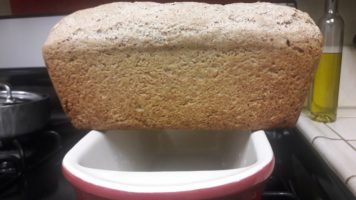

The skinny on Gluten
Today we are all being advised to avoid Gluten and buy Gluten free foods because we cannot digest Gluten properly. While it is true that people with Celiac disease and those who are highly Gluten sensitive should avoid it, most of us should be able to digest lesser amounts of Gluten just fine.
We become sensitive to Gluten by eating too much of it and because the modern diet leaves many of us with suboptimal digestion.
Our Grandparents would have been exposed to a fraction of the Gluten we are exposed to today, because back then they didn’t add so much of it to our foods. They began adding more because we love doughy bread and Gluten makes bread doughy. Pizza is a good example of a high Gluten food. Our Grandparents would also have had a more natural diet and been exposed to less toxins than we are.
Unfortunately, because many of us don’t have healthy diets, our digestive systems have become inflamed and do not digest our food well. Gluten is a difficult protein to digest in lesser amounts, but when you are not digesting effectively and you eat lots of Gluten all the time, it becomes a problem. Our bodies become “over sensitive” to Gluten and in fact many health issues arise because the immune system sees Gluten as a foreign invader. Most people need to get off Gluten for a few months and heal their digestive system. Eventually, the majority will be able to consume small quantities of Gluten again just fine.
Not understanding the cause of Gluten sensitivity has led many people who eat a highly processed food diet to switch to Gluten free processed foods while still eating an unhealthy diet. This approach initially eliminates symptoms, it does not however eliminate underlying issues. The food industry is happy making a fortune, but the consumer is left frustrated and unsure.
When you have food sensitivities, you always have digestive issues. Once digestion is compromised it can affect how you think, feel and fight off disease. Immunity not only can diminish, but it ca also go haywire and attack our own bodies.
The first order of business is to identify what digestive issues you have and what foods, chemicals and additives you are sensitive to. To find out what foods you are sensitive to, I recommend having a food sensitivity panel done. Unfortunately, if you are sensitive to one food, you are probably sensitive to others. Checking for Gluten sensitivity is relatively inexpensive and covered by most major insurances. Exclusion diets can be helpful, but they are not accurate if you have delayed food reactions. Exclusion diets do not address chemicals in foods either. Just because you eat wheat bread, for example, does not tell you what exactly in the bread bothered you, it could be the wheat, gluten or a chemical additive. I recommend getting tested to know for sure.
I offer food sensitivity testing including food additives and chemicals. I also offer a digestive test which tells us exactly how your digestion is functioning. The body will heal when the underlying issues are handled. When your gut is healthy, all aspects of your health can improve. The plan is simply to avoid what’s problematic while providing what the body needs to heal.
Dr. Jamie Gutheil, D.C. Clinical Nutritionist
Drjamiedc.com

